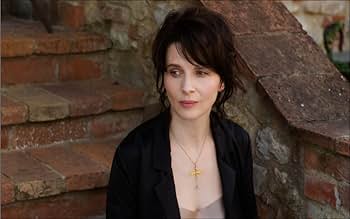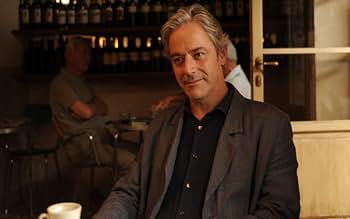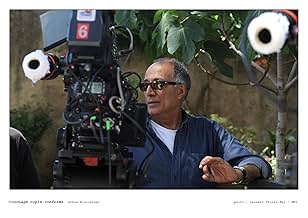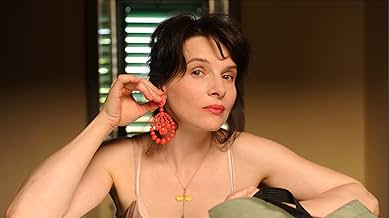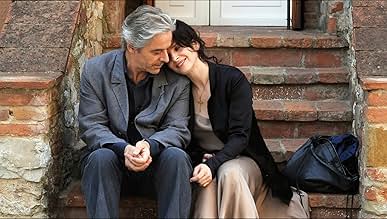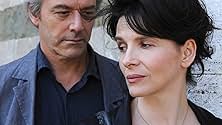CALIFICACIÓN DE IMDb
7.2/10
28 k
TU CALIFICACIÓN
En la Toscana, un escritor británico de mediana edad conoce a una mujer francesa que lo lleva al pueblo de Lucignano.En la Toscana, un escritor británico de mediana edad conoce a una mujer francesa que lo lleva al pueblo de Lucignano.En la Toscana, un escritor británico de mediana edad conoce a una mujer francesa que lo lleva al pueblo de Lucignano.
- Dirección
- Guionistas
- Elenco
- Premios
- 11 premios ganados y 29 nominaciones en total
Filippo Trojano
- Le marié
- (as Filippo Troiano)
Manuela Balsimelli
- La mariée
- (as Manuela Balsinelli)
- Dirección
- Guionistas
- Todo el elenco y el equipo
- Producción, taquilla y más en IMDbPro
Opiniones destacadas
If you're familiar with the movies of Iranian director Abbas Kiarostami, this is a big departure from his usual work. Shot in Italy with Juliette Binoche and some dude, it's basically a romantic comedy, but nothing like Hollywood would ever produce (well, it actually reminds a little bit of Before Sunset by Richard Linklater, but miles away from the Julia Roberts/Sandra Bullock avenue).
It's really enjoyable with unexpected progress of the story (unexpected especially if you're brainwashed by certain type of movies about male-female relationships). It has room for interpretation, everything is not explained and it lets the viewer bind the remaining threads. It's also funny and I found it quite intense. It held my attention and actually felt about ten minutes shorter than it really is. I have to admit that I'm a big fan of intelligent movies about male-female relationships. Long well written and acted scenes with just a man and a woman talking don't turn me off.
The formal control of the shots by the director and the cinematographer are masterful. There are those long shots that Kiarostami has used before, but used masterfully in the context of the story, and not in any "look at me, Mom, I'm sculpting in time" -art house tedium.
I talked with couple other persons who saw the movie, and they said that they didn't like it. But let me tell you that it's really good.
It's really enjoyable with unexpected progress of the story (unexpected especially if you're brainwashed by certain type of movies about male-female relationships). It has room for interpretation, everything is not explained and it lets the viewer bind the remaining threads. It's also funny and I found it quite intense. It held my attention and actually felt about ten minutes shorter than it really is. I have to admit that I'm a big fan of intelligent movies about male-female relationships. Long well written and acted scenes with just a man and a woman talking don't turn me off.
The formal control of the shots by the director and the cinematographer are masterful. There are those long shots that Kiarostami has used before, but used masterfully in the context of the story, and not in any "look at me, Mom, I'm sculpting in time" -art house tedium.
I talked with couple other persons who saw the movie, and they said that they didn't like it. But let me tell you that it's really good.
"Certified Copy" is a film essentially cut in two. Both halves are lovely and when put together it makes for a remarkable whole work. It's a very simple film on the surface, the plot made up almost entirely of a day-long conversation between an author (William Shimell) and a woman (Juliette Binoche) showing him around town. The conversation begins with them being these strangers meeting for the first time, as they discuss his new book (the title of the film) and the theories he brings up within it. They discuss the significance of a copy as opposed to it's original and the film brings up a lot of questions on artificiality, within culture and within life. Questions arise as to whether or not every individual person is just essentially a copy of someone else, and this becomes absolutely fascinating. Then, everything changes. A waitress at a cafe mistakes them for a married couple and the two spend the rest of the day going along with this, playing a game that they are married and they go back and forth as an unhappy couple would.
Or was it mistake? It becomes clear that these people have some connection with each other, whether they are divorced, former lovers or something entirely separate, and the conversation becomes much more biting and intriguing. Writer/director Abbas Kiarostami keeps us gripped into this conversation, as these two ponder on the copies of the world, along with the tribulations of a marriage, what makes a good husband, what makes a good father and so much more. She attacks him for being such an absent father (is her son really his?) and he explains that sometimes one partner in the marriage just has to be gone and that's the way the world is. The film poses so many interesting questions on the world and leaves it up to the viewer to decide the answers for themselves. Each character has their own strong opinion, but Kiarostami never takes a side and tells the viewer the resolution. It's a powerful picture that keeps you thinking long after it's over.
Part of the power of course relies on the strength of the performances, and both of these actors knock it out of the park. William Shimell was the perfect choice for the distant, simple author. Juliette Binoche, however, steals the show, with an authentic and brave performance that ranks up with some of her absolute best. She is arguably the finest actress in cinema today, and has a grasp on portraying vulnerability that very few actors can come close to achieving. Within her you really see the pain of a woman scorned and the exhausting life led by a single mother constantly having to think of someone other than herself. She is everything here; emotional, strong, falling apart and beautiful. It's a perfect performance in a magnificent film. I feel like this is a picture that will only get better on repeated viewings, and it's still quite strong on the first one.
Or was it mistake? It becomes clear that these people have some connection with each other, whether they are divorced, former lovers or something entirely separate, and the conversation becomes much more biting and intriguing. Writer/director Abbas Kiarostami keeps us gripped into this conversation, as these two ponder on the copies of the world, along with the tribulations of a marriage, what makes a good husband, what makes a good father and so much more. She attacks him for being such an absent father (is her son really his?) and he explains that sometimes one partner in the marriage just has to be gone and that's the way the world is. The film poses so many interesting questions on the world and leaves it up to the viewer to decide the answers for themselves. Each character has their own strong opinion, but Kiarostami never takes a side and tells the viewer the resolution. It's a powerful picture that keeps you thinking long after it's over.
Part of the power of course relies on the strength of the performances, and both of these actors knock it out of the park. William Shimell was the perfect choice for the distant, simple author. Juliette Binoche, however, steals the show, with an authentic and brave performance that ranks up with some of her absolute best. She is arguably the finest actress in cinema today, and has a grasp on portraying vulnerability that very few actors can come close to achieving. Within her you really see the pain of a woman scorned and the exhausting life led by a single mother constantly having to think of someone other than herself. She is everything here; emotional, strong, falling apart and beautiful. It's a perfect performance in a magnificent film. I feel like this is a picture that will only get better on repeated viewings, and it's still quite strong on the first one.
In Tuscany, a French woman (Juliette Binoche) arrives in a lecture room to see the middle-aged British writer James Miller (William Shimell), who has published a book about the validity of copies versus original works. However, her son forces her to leave the lecture early and she gives her phone number to a common friend to give it to James.
He comes to her antique shop and invites her to drive around. However, she takes James to the village of Lucignano. While they are traveling, he autographs six books she had bought and they discuss the subject of his book. When they arrive in the village, they are mistakenly taken as husband and wife and the woman decides to play the game and soon the bitter James Miller assumes the role of her husband.
I am not a fan of Abbas Kiarostami, but I see his movies since they are usually challenging and open to interpretations. I have just seen "Copie Conforme" on DVD and I have my understanding of the story that may be or may be not the real intention of this Iranian writer / director.
Juliette Binoche's character definitely knows James Miller and there are evidences: first, she has a reserved spot in his lecture; then her son comments that she had decided to fall in love with the British writer; last, when James arrives in her antique shop, they do not introduce themselves to each other and they are not too formal as strangers certainly would be.
I believe that James Miller first met her years ago while she was walking on street with her son following her but never together. She probably would be a single mother with rejection to her son and on that occasion they might have become lovers or they had at least a love affair in the hotel that they visit in the end but James probably would be married.
They travel to the romantic village of Lucignano and they have a long discussion about copies and originals art works. When the owner of the cafeteria believes that they are married, the French woman plays games with James Miller pretending that they have been married for fifteen years, probably because she might have wanted to be his wife in the past. In the end, there is a parallel with the central subject of the story, copies vs. originals, and the drama turns into a faithful copy of a romantic comedy with a long-term marriage. My vote is seven.
Title (Brazil):"Cópia Fiel ("Faithful Copy")
He comes to her antique shop and invites her to drive around. However, she takes James to the village of Lucignano. While they are traveling, he autographs six books she had bought and they discuss the subject of his book. When they arrive in the village, they are mistakenly taken as husband and wife and the woman decides to play the game and soon the bitter James Miller assumes the role of her husband.
I am not a fan of Abbas Kiarostami, but I see his movies since they are usually challenging and open to interpretations. I have just seen "Copie Conforme" on DVD and I have my understanding of the story that may be or may be not the real intention of this Iranian writer / director.
Juliette Binoche's character definitely knows James Miller and there are evidences: first, she has a reserved spot in his lecture; then her son comments that she had decided to fall in love with the British writer; last, when James arrives in her antique shop, they do not introduce themselves to each other and they are not too formal as strangers certainly would be.
I believe that James Miller first met her years ago while she was walking on street with her son following her but never together. She probably would be a single mother with rejection to her son and on that occasion they might have become lovers or they had at least a love affair in the hotel that they visit in the end but James probably would be married.
They travel to the romantic village of Lucignano and they have a long discussion about copies and originals art works. When the owner of the cafeteria believes that they are married, the French woman plays games with James Miller pretending that they have been married for fifteen years, probably because she might have wanted to be his wife in the past. In the end, there is a parallel with the central subject of the story, copies vs. originals, and the drama turns into a faithful copy of a romantic comedy with a long-term marriage. My vote is seven.
Title (Brazil):"Cópia Fiel ("Faithful Copy")
Euro intellectual recession-time story? I recommend Copie Conforme because of and in spite of the difficulty in watching it. The difficulty resides in the multiple layers involved in the relationship of the two protagonists, not to speak of the three languages that they both speak in various circumstances. The more the the action evolves, the less we seem to understand the real nature of their relationship. What we do know is that those two have a problem of communication. It is this struggle of seduction/rejection, with setbacks and all that make it worth watching. Atmosphere and the man-woman tension is what keeps it going. The filming is impeccable, with lovely scenes of Tuscany, excellent camera, and the great work on surrounding noises, which I believe replaces any music at all. The acting is also very fine, with Binoche deservedly getting a major Cannes Film Festival award.
All reviewers so far have either opted for 8 or 2. That is a sure sign that something is going on, I am willing to risk flack from all sides and say that Cerified Copy is was it is: a look at how we layer our relationships, an hour and forty minutes of conversations, broken with moments of silence and walking, and about two people who may or may not be in a some sort of relationship or connection.
It has originality - it will not be like other films seen recently in mainstream European cinema, there is little or no plot, or action, rather we dealing with conversation, and the state of the heart and the mind in a fiercely non-Hollywood fashion. This is a film about thinking about emotions, and is almost non-linear in its conversations and if that concept doesn't appeal then it may well not be viewable.
It is, however, despite itself, pretty mesmerizing - what will they say next? what other aspect of why relationships fail and succeed will be tossed into the salad? who are they? why the games? etc;
The conversations are both alienating and intimate, and have a "play-acting" aspect that allows the psychosexual aspect of how we adults explore potentiality to be examined in a way that is normally reduced to sexual tension and flirting on film. This is a film that demands attention - this is not dumb film-making. I recognize the conversations and the feeling well, but in a sense the connection is too contrived to be really successful - but it certainly touches that part of intimacy that is normally, at best, ethereal.
The setting of Chianti and a beautiful hot summer day, with cicadas and a wonderful small town to explore, lightens this - but it remains a film for philosopher romantics. It is, as others here have noted in better ways than me, film as film - here there are images and shots that work to compliment the alienation and solipsistic nature of the two leads.
A film about questions that offers few answers, it is certainly intriguing and if you are into human exploration and condition worth the effort to watch.
It has originality - it will not be like other films seen recently in mainstream European cinema, there is little or no plot, or action, rather we dealing with conversation, and the state of the heart and the mind in a fiercely non-Hollywood fashion. This is a film about thinking about emotions, and is almost non-linear in its conversations and if that concept doesn't appeal then it may well not be viewable.
It is, however, despite itself, pretty mesmerizing - what will they say next? what other aspect of why relationships fail and succeed will be tossed into the salad? who are they? why the games? etc;
The conversations are both alienating and intimate, and have a "play-acting" aspect that allows the psychosexual aspect of how we adults explore potentiality to be examined in a way that is normally reduced to sexual tension and flirting on film. This is a film that demands attention - this is not dumb film-making. I recognize the conversations and the feeling well, but in a sense the connection is too contrived to be really successful - but it certainly touches that part of intimacy that is normally, at best, ethereal.
The setting of Chianti and a beautiful hot summer day, with cicadas and a wonderful small town to explore, lightens this - but it remains a film for philosopher romantics. It is, as others here have noted in better ways than me, film as film - here there are images and shots that work to compliment the alienation and solipsistic nature of the two leads.
A film about questions that offers few answers, it is certainly intriguing and if you are into human exploration and condition worth the effort to watch.
¿Sabías que…?
- TriviaDuring a visit in Tehran by Juliette Binoche, Abbas Kiarostami told Binoche the synopsis of Certified Copy as a casual anecdote, which she said that she fully believed until he confessed to having made it up. According to Kiarostami, studying the reactions of Binoche as she listened to the story was a vital part of the film's further development.
- Citas
James Miller: It seems to me that the human race is the only species who have forgotten the whole purpose of life, the whole meaning of existence is to have fun, to have pleasure. And here is someone who's found their own way to do it. We shouldn't judge them for it. If they're happy and enjoying life, we should congratulate them, not criticize them.
- ConexionesFeatured in Breakfast: Episode dated 31 August 2010 (2010)
- Bandas sonorasO surdato 'nnamurrato
Written by Aniello Califano (as A. Califano) and the music by Enrico Cannio (as E. Cannio)
Selecciones populares
Inicia sesión para calificar y agrega a la lista de videos para obtener recomendaciones personalizadas
- How long is Certified Copy?Con tecnología de Alexa
Detalles
- Fecha de lanzamiento
- Países de origen
- Sitios oficiales
- Idiomas
- También se conoce como
- Certified Copy
- Locaciones de filmación
- Productoras
- Ver más créditos de la compañía en IMDbPro
Taquilla
- Presupuesto
- EUR 7,000,000 (estimado)
- Total en EE. UU. y Canadá
- USD 1,373,975
- Fin de semana de estreno en EE. UU. y Canadá
- USD 77,937
- 13 mar 2011
- Total a nivel mundial
- USD 7,736,632
- Tiempo de ejecución
- 1h 46min(106 min)
- Color
- Mezcla de sonido
- Relación de aspecto
- 1.85 : 1
Contribuir a esta página
Sugiere una edición o agrega el contenido que falta




